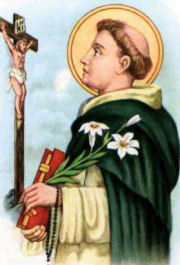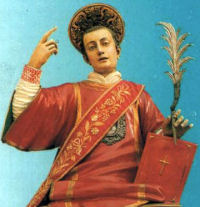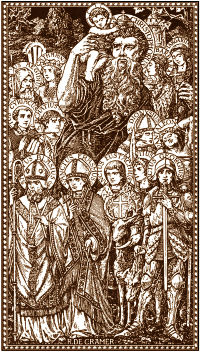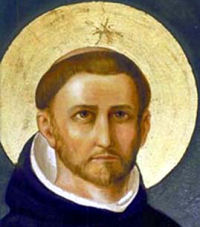 8th
8th Memorial of St. Dominic, priest Old Calendar: St. John Mary Vianney, confessor; Sts. Cyriac, Largus and Smaragdus, martyrs; Fourteen Holy Helpers (Hist)
At the end of the twelfth century the Church in France was ravaged by the Albigensian heresy, a doctrine which was not only entirely unchristian but which, in addition, constituted a social evil. Effective measures were required to be taken to combat it. Where others had failed, a Spanish canon, Dominic Guzman, succeeded. He was notable for his learning and love of poverty. The Order of Friars Preachers, which he founded about the year 1215, was endowed by him with these two characteristics; instead of manual labor, as practiced by the Cistercian monks, he required his friars to work with their minds by preaching and teaching. He died at Bologna on August 6, 1221. His friend, Gregory IX, canonized him three years later.
According to the 1962 Missal of Bl. John XXIII the Extraordinary Form of the Roman Rite, today is the feast of St. John Mary Vianney and Sts. Cyriac, Largus and Smaragdus. St. Largus and St. Smaragdus are two Roman martyrs. They were buried at first on the Ostian Way. Their bodies were later transferred, after the peace of Constantine, to a church built near the baths of Diocletian by a Christian of the name of Cyriacus. The cult of St. Cyriacus has been joined to that of the two martyrs. St. Dominic's feast in this rite is celebrated on August 4. St. John Vianney's feast in the Ordinary Form of the Roman Rite is celebrated on August 4.
The Fourteen "Auxiliary Saints" or "Holy Helpers" are a group of saints invoked because they have been efficacious in assisting in trials and sufferings. Each saint has a separate feast or memorial day, and the group was collectively venerated on August 8, until the 1969 reform of the Roman calendar, when the feast was dropped.
St. Dominic
 The Martyrology gives the following: "At Bologna (upper Italy) the holy confessor Dominic, the saintly and learned founder of the Order of Preachers. He preserved his virginity inviolate and gained for himself the grace of raising three dead persons to life. By his word he crushed heresy in the bud and led many souls to piety and to religious life."
The Martyrology gives the following: "At Bologna (upper Italy) the holy confessor Dominic, the saintly and learned founder of the Order of Preachers. He preserved his virginity inviolate and gained for himself the grace of raising three dead persons to life. By his word he crushed heresy in the bud and led many souls to piety and to religious life."
Born about 1175 in Castile (Spain), Dominic hailed from the illustrious Guzman family. First he was a canon regular at Osma; then he founded the Dominican Order, which was approved in 1216. Alongside the Franciscans, it became the most powerful Order in medieval times, giving the Church illustrious preachers — St. Vincent Ferrer, and contemplatives, Sts. Thomas of Aquinas and Pius V — and contributing immeasurably to maintaining the purity of the faith. Through the example of apostolic poverty and the preaching of the word of God the Friar Preachers were to lead men to Christ. To St. Dominic is attributed the origin and spread of the holy rosary.
The two contemporaries, Dominic and Francis, effected a tremendous spiritual rejuvenation through their own spiritual personalities and through their religious foundations. Of the two, Dominic was the realist who surpassed the other intellectually and in organizational talent. His spirit of moderation, clarity of thought, and burning zeal for souls have become the heritage of the Dominican Order. Legend has contributed the following rare anecdote as preserved in the Breviary: "During pregnancy, Dominic's mother dreamed she was carrying in her womb a little dog that held a burning torch between its teeth; and when she had given birth, it set the whole world on fire. By this dream it was made manifest beforehand how Dominic would inflame the nations to the practice of Christian virtue through the brightness of his holy example and the fiery ardor of his preaching." He died at Bologna upon hearing the liturgy's prayer for the dying: "Come, ye saints of God, hasten hither, ye angels!"
Excerpted from The Church's Year of Grace, Pius Parsch
St. Cyriac and Companions
 The Acts concerning these martyrs give many fictional details. Together with Sisinius, Largus and Smaragdus, Cyriac languished a long time in prison. Among the miracles that Cyriac worked was that of freeing through his prayer Arthemia, the daughter of Emperor Diocletian, from an evil spirit. Thereupon he was sent to the Persian king Sapor and performed a similar miracle in favor of his daughter Jobias. But after baptizing the king and 430 of his entourage, he returned to Rome. Upon orders from Maximian the Emperor, he was arrested, chained, and dragged to prison. Four days later he was taken from confinement, drenched with seething pitch, and tortured on the rack; in company with Smaragdus and twenty other Christians he finally was beheaded on the Via Salaria near the gardens of Sallust."
The Acts concerning these martyrs give many fictional details. Together with Sisinius, Largus and Smaragdus, Cyriac languished a long time in prison. Among the miracles that Cyriac worked was that of freeing through his prayer Arthemia, the daughter of Emperor Diocletian, from an evil spirit. Thereupon he was sent to the Persian king Sapor and performed a similar miracle in favor of his daughter Jobias. But after baptizing the king and 430 of his entourage, he returned to Rome. Upon orders from Maximian the Emperor, he was arrested, chained, and dragged to prison. Four days later he was taken from confinement, drenched with seething pitch, and tortured on the rack; in company with Smaragdus and twenty other Christians he finally was beheaded on the Via Salaria near the gardens of Sallust."
Popular piety has numbered St. Cyriac among the "Fourteen Holy Helpers." The existence of a martyr with this name seems well attested by the trustworthy Depositio Martyrum of 354. The remaining details in the above account are pure fiction. But the story may bring to mind that endless series of heroic souls who suffered for Christ even more dreadful tortures than those fiction describes.
Excerpted from The Church's Year of Grace, Pius Parsch
Patron: Astronomers; astronomy; scientists; falsely accused people.
Symbols: Lily; dog; book; star in forehead; pilgrim's staff; rosary; cross and rosary; dog holding torch; books in a fire.
The Fourteen Holy Helpers
 The Fourteen Holy Helpers are invoked as a group because of the Black Plague which devastated Europe from 1346 to 1349. Among its symptoms were the black tongue, a parched throat, violent headache, fever, and boils on the abdomen. The victims were attacked without warning, robbing them of their reason, and killed within a few hours; many died without the last Sacraments. No one was immune, and the disease wreaked havoc in villages and family circles. The epidemic appeared incurable. The pious turned to Heaven, begging the intervention of the saints, praying to be spared or cured. Each of these fourteen saints had been efficacious in interceding in some aspect for the stricken during the Black Plague. The dates are the traditional feast days; not all the saints are on the General Roman Calendar.
The Fourteen Holy Helpers are invoked as a group because of the Black Plague which devastated Europe from 1346 to 1349. Among its symptoms were the black tongue, a parched throat, violent headache, fever, and boils on the abdomen. The victims were attacked without warning, robbing them of their reason, and killed within a few hours; many died without the last Sacraments. No one was immune, and the disease wreaked havoc in villages and family circles. The epidemic appeared incurable. The pious turned to Heaven, begging the intervention of the saints, praying to be spared or cured. Each of these fourteen saints had been efficacious in interceding in some aspect for the stricken during the Black Plague. The dates are the traditional feast days; not all the saints are on the General Roman Calendar.
(1) St. George (April 23rd), soldier-martyr. Invoked for protection for domestic animals and against herpetic diseases. Also patron of soldiers, England, Portugal, Germany, Aragon, Genoa and Venice.
(2) St. Blaise (also Blase and Blasius) (February 3rd), bishop and martyr. He is invoked against diseases of the throat. Blessing of the throats takes place on his feast day.
(3) St. Erasmus (also St. Elmo) (June 2nd), bishop and martyr. He is invoked against diseases of the stomach and intestine, protection for domestic animals and patron of sailors.
(4) St. Pantaleon (July 27th), bishop and martyr. Invoked against consumption, protection for domestic animals and patron of physicians and midwives.
(5) St. Vitus (also St. Guy) (June 15th), martyr. Invoked in epilepsy, chorea ("St. Vitus' dance"), lethargy, and the bites of poisonous or mad animals and against storms. Also protection for domestic animals. Patron of dancer and actors.
(6) St. Christopher (also Christophorus) (July 25th), martyr. Invoked against the plague and sudden death. He is the patron of travelers, especially motorists, and is also invoked in storms.
(7) St. Denis (also Dionysius) (October 9th), bishop and martyr. Invoked against diabolical possession and headaches.
(8) St. Cyriacus (also Cyriac) (August 8th), deacon and martyr. Invoked against diseases of the eye and diabolical possession. Also interceded for those in temptation, especially at the time of death.
(9) St. Acathius (also Acacius) (May 8th), martyr. Invoked against headaches and at the time of death's agony.
(10) St. Eustace (also Eustachius, Eustathius) (September 20th), martyr. Invoked against fire — temporal and eternal. Patron of hunters. Patron in all kinds of difficulties, and invoked in family troubles.
(11) St. Giles (also Aegidius) (September 1st), hermit and abbot. Invoked against the plague, panic, epilepsy, madness, and nightmares and for a good confession. Patron of cripples, beggars, and breastfeeding mothers.
(12) St. Margaret of Antioch (July 20th), virgin and martyr. Invoked against backache. Patron for women in childbirth.
(13) St. Catherine of Alexandria (November 25th), virgin and martyr. Invoked against diseases of the tongue, protection against a sudden and unprovided death. Patroness of Christian philosophers, of maidens, preachers, wheelwrights and mechanics. She is also invoked by students, orators, and barristers as "the wise counselor."
(14) St. Barbara (December 4th), virgin and martyr. Invoked against fever and sudden death. Patron of builders, artillerymen and miners. Also invoked against lightning, fire and sudden death.

 8th
8th  The Martyrology gives the following: "At Bologna (upper Italy) the holy confessor Dominic, the saintly and learned founder of the Order of Preachers. He preserved his virginity inviolate and gained for himself the grace of raising three dead persons to life. By his word he crushed heresy in the bud and led many souls to piety and to religious life."
The Martyrology gives the following: "At Bologna (upper Italy) the holy confessor Dominic, the saintly and learned founder of the Order of Preachers. He preserved his virginity inviolate and gained for himself the grace of raising three dead persons to life. By his word he crushed heresy in the bud and led many souls to piety and to religious life."  The Acts concerning these martyrs give many fictional details. Together with Sisinius, Largus and Smaragdus, Cyriac languished a long time in prison. Among the miracles that Cyriac worked was that of freeing through his prayer Arthemia, the daughter of Emperor Diocletian, from an evil spirit. Thereupon he was sent to the Persian king Sapor and performed a similar miracle in favor of his daughter Jobias. But after baptizing the king and 430 of his entourage, he returned to Rome. Upon orders from Maximian the Emperor, he was arrested, chained, and dragged to prison. Four days later he was taken from confinement, drenched with seething pitch, and tortured on the rack; in company with Smaragdus and twenty other Christians he finally was beheaded on the Via Salaria near the gardens of Sallust."
The Acts concerning these martyrs give many fictional details. Together with Sisinius, Largus and Smaragdus, Cyriac languished a long time in prison. Among the miracles that Cyriac worked was that of freeing through his prayer Arthemia, the daughter of Emperor Diocletian, from an evil spirit. Thereupon he was sent to the Persian king Sapor and performed a similar miracle in favor of his daughter Jobias. But after baptizing the king and 430 of his entourage, he returned to Rome. Upon orders from Maximian the Emperor, he was arrested, chained, and dragged to prison. Four days later he was taken from confinement, drenched with seething pitch, and tortured on the rack; in company with Smaragdus and twenty other Christians he finally was beheaded on the Via Salaria near the gardens of Sallust."  The Fourteen Holy Helpers are invoked as a group because of the Black Plague which devastated Europe from 1346 to 1349. Among its symptoms were the black tongue, a parched throat, violent headache, fever, and boils on the abdomen. The victims were attacked without warning, robbing them of their reason, and killed within a few hours; many died without the last Sacraments. No one was immune, and the disease wreaked havoc in villages and family circles. The epidemic appeared incurable. The pious turned to Heaven, begging the intervention of the saints, praying to be spared or cured. Each of these fourteen saints had been efficacious in interceding in some aspect for the stricken during the Black Plague. The dates are the traditional feast days; not all the saints are on the General Roman Calendar.
The Fourteen Holy Helpers are invoked as a group because of the Black Plague which devastated Europe from 1346 to 1349. Among its symptoms were the black tongue, a parched throat, violent headache, fever, and boils on the abdomen. The victims were attacked without warning, robbing them of their reason, and killed within a few hours; many died without the last Sacraments. No one was immune, and the disease wreaked havoc in villages and family circles. The epidemic appeared incurable. The pious turned to Heaven, begging the intervention of the saints, praying to be spared or cured. Each of these fourteen saints had been efficacious in interceding in some aspect for the stricken during the Black Plague. The dates are the traditional feast days; not all the saints are on the General Roman Calendar.
